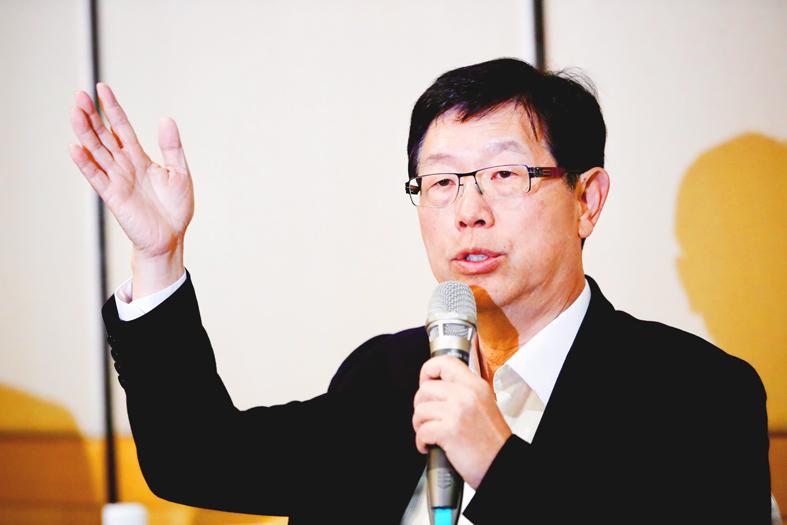Component shortages would not affect Hon Hai Precision Industry Co’s (鴻海精密) production by more than 10 percent, company chairman Young Liu (劉揚偉) said yesterday, adding that he is “cautiously optimistic” about the information and communications technology business this year.
Speaking at an investors’ conference in Taipei, Liu said the effects of the shortages in the first two months of this quarter were not too obvious, because the company’s customers are major companies.
“Still, we are seeing some gradual changes and are monitoring the situation cautiously,” Liu said. “However, according to our observation, it is not going to be a major factor, maybe under 10 percent.”

Photo: Ritchie B. Tongo, EPA-EFE
The shortages would not run their course until next year, and Hon Hai would pick up market share on major handset products and is ahead of its competitors regarding regional manufacturing, he said.
“We have been in India for a long time, while other competitors are just trying to get in,” Liu said. “As they are finding out, it is not that easy.”
Liu also said Hon Hai would announce new electric vehicle (EV) facilities in “either the US or Mexico” by the end of June.
“Our rule of thumb is that if we want to make 10,000 EVs in one month, we need to invest US$1 billion,” he said, adding that Hon Hai is looking to build pilot and regular production facilities.
The company has targeted EVs as a major growth driver in the years to come, and the Hon Hai-initiated MIH Open Platform Alliance, which has attracted more than 1,300 participants, would help the firm focus on business-to-business sales, while empowering business-to-customer companies, Liu said.
“Hon Hai’s vertical integration is going to be key in the EV space, which does not have a carefully defined division of labor yet,” he said. “With Hon Hai’s proven ability in precision mold making and chemical materials, we will make a new generation of batteries.”
The company reported that net profit last year fell 12 percent year-on-year to NT$101.795 billion (US$3.57 billion), after net profit in the final quarter of last year declined 3.7 percent to NT$45.98 billion.
The company blamed the decline on COVID-19-related problems faced by its subsidiaries.
Total revenue last year increased 0.3 percent annually to NT$5.36 trillion, after fourth-quarter revenue rose 15 percent on the back of robust iPhone 12 shipments, it said.
Earnings per share were NT$7.34 last year, compared with NT$8.32 a year earlier, it added.
The company plans to distribute a cash dividend of NT$4 per share, which suggests a payout ratio of 54.5 percent.
Gross margin was 5.65 percent last year, down from 5.91 percent in 2019.
Liu said a gross margin of 7 percent for this year is “possible.”

Taiwanese suppliers to Taiwan Semiconductor Manufacturing Co. (TSMC, 台積電) are expected to follow the contract chipmaker’s step to invest in the US, but their relocation may be seven to eight years away, Minister of Economic Affairs J.W. Kuo (郭智輝) said yesterday. When asked by opposition Chinese Nationalist Party (KMT) Legislator Niu Hsu-ting (牛煦庭) in the legislature about growing concerns that TSMC’s huge investments in the US will prompt its suppliers to follow suit, Kuo said based on the chipmaker’s current limited production volume, it is unlikely to lead its supply chain to go there for now. “Unless TSMC completes its planned six

Intel Corp has named Tasha Chuang (莊蓓瑜) to lead Intel Taiwan in a bid to reinforce relations between the company and its Taiwanese partners. The appointment of Chuang as general manager for Intel Taiwan takes effect on Thursday, the firm said in a statement yesterday. Chuang is to lead her team in Taiwan to pursue product development and sales growth in an effort to reinforce the company’s ties with its partners and clients, Intel said. Chuang was previously in charge of managing Intel’s ties with leading Taiwanese PC brand Asustek Computer Inc (華碩), which included helping Asustek strengthen its global businesses, the company

Power supply and electronic components maker Delta Electronics Inc (台達電) yesterday said second-quarter revenue is expected to surpass the first quarter, which rose 30 percent year-on-year to NT$118.92 billion (US$3.71 billion). Revenue this quarter is likely to grow, as US clients have front-loaded orders ahead of US President Donald Trump’s planned tariffs on Taiwanese goods, Delta chairman Ping Cheng (鄭平) said at an earnings conference in Taipei, referring to the 90-day pause in tariff implementation Trump announced on April 9. While situations in the third and fourth quarters remain unclear, “We will not halt our long-term deployments and do not plan to

The New Taiwan dollar and Taiwanese stocks surged on signs that trade tensions between the world’s top two economies might start easing and as US tech earnings boosted the outlook of the nation’s semiconductor exports. The NT dollar strengthened as much as 3.8 percent versus the US dollar to 30.815, the biggest intraday gain since January 2011, closing at NT$31.064. The benchmark TAIEX jumped 2.73 percent to outperform the region’s equity gauges. Outlook for global trade improved after China said it is assessing possible trade talks with the US, providing a boost for the nation’s currency and shares. As the NT dollar